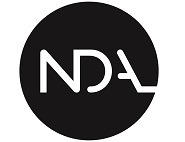NDA Innovation strategy
Published 13 June 2022
Foreword
Innovation matters
Delivering our decommissioning mission is expected to cost over £120 billion and take us into the next century. The scale and timescale present many challenges, but also create a huge platform for innovation; and opportunities to do things differently.
By innovating, we could lead the way in sustainable and rapid decommissioning, create a safer working environment and return our sites for community reuse earlier, significantly reducing the overall burden on the taxpayer.
The atomic age involved talented people coming together, trying new things, learning from experiments and setbacks to push the boundaries of what was possible. As we tackle our shared nuclear legacy, we can help shape and define the new art of the possible and create a better future for those who will come next.
Our purpose is clear but feedback from across the group indicates we can and want to do better. We need to modernise and try new things and we have the opportunity to take a visible lead. That requires us to be bold and ambitious.
We need to challenge our current thinking. We have to question our assumptions and approach problems differently. We can explore new possibilities, exploit emerging technologies and seize opportunities, even when the outcome may be uncertain at the start. We need to confront topics that may make us feel uncomfortable-the fear of failure and our natural aversion to risk. That takes courage.
Organisational changes are well underway across the NDA group. But the wider global, fiscal and policy context is also changing around us, requiring us to continually adapt. We can view that as a threat, or a real opportunity to accelerate our innovation ambition.
We recognise we don’t have all the answers we need right now. But by being curious, setting out where we would like to get to, sharing our approach, the challenges and being open about our successes and our setbacks – enables us to start new conversations, exchange information and explore what a different future could look like.
We will harness the knowledge and expertise from our sector and bolster that with expertise from other government departments and from other sectors. Collaboration will provide a great source of ideas, new approaches and solutions and is something we will actively pursue.
Skills development is important for us too – we need to upskill, unleash our creativity, diversify our thinking and recruit and retain the subject matter experts for the future, so that new skills will be available and applied when we need them.
It’s not just about the technology and skills, it’s also about changing the wider group culture and creating a business environment where innovation is enabled and can thrive. That’s not easy to achieve, but it’s important. This is something I am passionate about and will actively champion within the NDA Group Leadership Team.
Alan Cumming NDA Group Director of Operations and Performance Improvement
What do we mean by innovation?
There isn’t one single definition. Put simply, we can think of innovation as: doing something new which creates value.
It can be new to the world, new to your team or simply new to you.
The value depends on the context, people involved and what is important to them.
Why does innovation apply to me?
Innovation is inherently linked to something we all possess – the ability to be creative. Tapping into our imaginations helps us explore future possibilities, generate new ideas, identify new ways to approach a challenge or envision how we could do something in a different way.
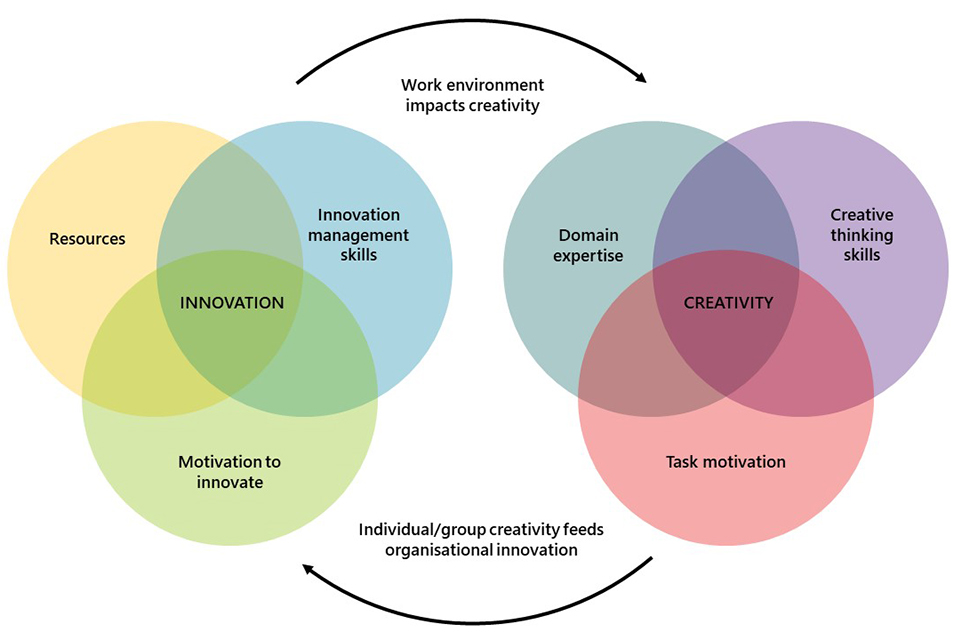
Successful organisations create the opportunities, capacity and wider environment which enables people to innovate. Increasing an organisation’s innovation capability enables it to make well informed business decisions, which are aligned to its overarching business strategy. This strategy may be to survive, sustain an existing position or improve upon it to grow the business.
Innovation, alongside research and development, is a critical enabler of the NDA’s published strategy. As well as enabling the current business, innovation can also drive wider business change too and help it improve. For us to be successful, create future options which enable us to grow or adapt to wider changes, innovation needs to be woven into the very fabric of our business. This extends beyond technology and engineering and includes our approach to project management, finance, risk, contracting, skills development, assurance and approvals. It will also draw heavily upon our collective knowledge management capability and information infrastructure.
We all have the ability to innovate, but the term innovation can also describe a specific process too. This includes a range of activities, which may typically include:
- The identification and articulation of an opportunity, trend, challenge or problem.
- Initial analysis and assessment of the need, its priority and its alignment to an overarching agreed objective, purpose or strategy.
- Generating ideas or seeking new solutions, canvassing a wide range of sources.
- Refining and maturing those ideas or solutions in line with user needs.
- Experimentation, prototyping and testing and implementing improvements.
- Initial trialling and deployment in a representative environment, understanding wider barriers to implementation.
- Scale up and transition into day-to-day operation/business as usual.
- Ongoing iterative review and assessment of the outcomes and benefits.
Every stage in this journey can be delivered in a variety of different ways and depends on the nature and scale of the challenge/ opportunity, the people involved, the wider situational context, as well as other enablers, such as the availability of contracting mechanisms and funding.
All stages should have a defined review point, a clear output and expected outcome. In reality, this journey is highly iterative. Not all ideas are feasible, trials can fail, some solutions won’t viably scale, but the overall process should continually improve understanding, increase knowledge and increase value over time aligned to the organisation’s objectives.
Although innovation teams can provide guidance and support in how to navigate and manage this process, for innovation to be successful, efficient and self-sustaining long term, the approach requires sponsorship from within the business, active stakeholder participation and buy-in throughout. It also requires access to core underpinning infrastructure in order to capture and retain the knowledge gained - so any value can be amplified through reuse.
Where are we now?
Across the NDA group, we already innovate to deliver the decommissioning mission.
Innovation within the NDA group
Many innovative activities take place as part of business-as-usual activity, but we could be better at capturing or enabling the outcomes, outputs and lessons for wider site or group re-use. These activities are led, funded and undertaken by projects or functional teams; often working in collaboration with established supply chains.
The majority of this activity is incremental in nature; exploiting mature approaches or existing technologies deployed in new ways (i.e., adapting). This work is largely undertaken within existing project structures and is often shorter-term, reactive or driven by necessity; in response to specific incidents, obsolescence or unplanned engineering issues which arise on each site.
Specific directed projects to improve or enhance performance may be commissioned as part of ongoing continuous improvement activities (i.e., to sustain an existing process). Once trialled and the benefits evaluated, these enhancements can then be implemented and incorporated within wider site processes, realising additional benefits.
In some cases, and increasingly so for those sites with centralised innovation resources, standalone competitions may be initiated which call for ideas or which seek to identify solutions or services to address enduring risks or recurring challenges that occur within programmes or affect specific sites.
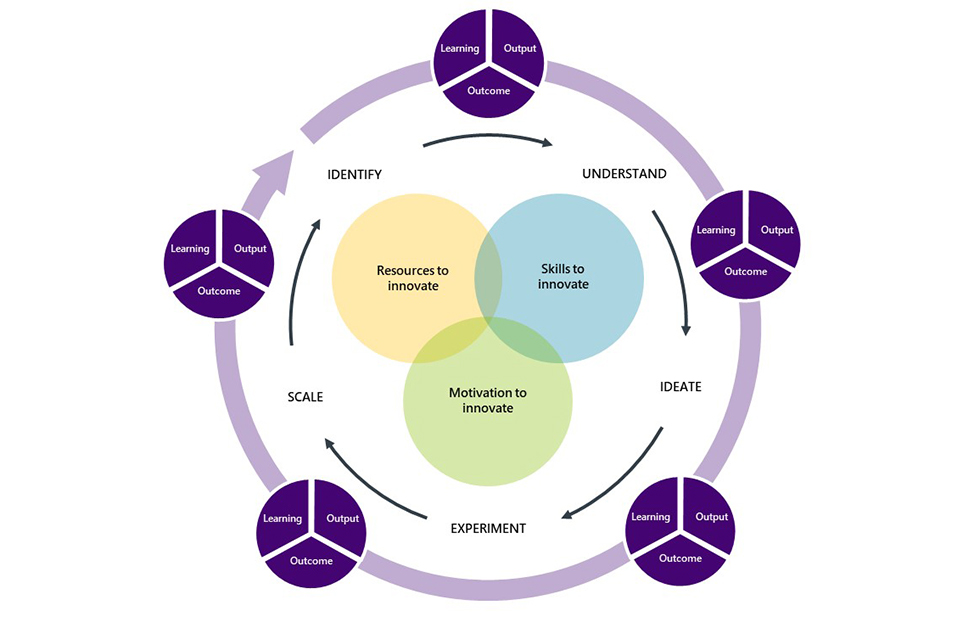
NDA’s role in innovation
The NDA has an additional role in driving innovation across the wider NDA group. The NDA leads on developing the strategy; to maximise the impact and value of our collective innovation efforts in support of the NDA’s mission, and wider organisational objectives. This involves; understanding current approaches, spotting trends and system wide challenges, sharing and signposting best practice, identifying common barriers and helping to create the strategic focus, progressive environment and culture which enables innovation to thrive.
The NDA also runs a technology-focussed, innovation delivery portfolio which seeks out new collaborative opportunities and explores higher risk approaches which have group-wide applicability. This portfolio consists mainly of challenge-orientated projects which have the potential to disrupt or transform decommissioning activities; delivering a step change in what we could do or how we could do it (i.e., creating new viable delivery solutions or changing long-term planning assumptions.) The focus to date has been predominantly on identifying and accelerating the development of emerging technologies and novel integration approaches to generate new services or systems that could be deployed in support of future mission delivery. This portfolio has been undertaken in collaboration with end-users from within the group’s operating companies.
These projects trial open innovation approaches. This involves establishing new agreements with other government departments, innovation organisations, international partners and with other industrial sectors (e.g., oil and gas, space, defence). These provide NDA group access to new ideas, encourage technology transfer across industrial sectors, leverage wider innovation investment and expand the future supply chain. A recent independent baseline review has indicated that adopting this approach to innovation has yielded significant value to date, but there is a substantially bigger prize on offer in relation to mission delivery and wider economic growth, if projects within this pipeline can be successfully implemented within operating companies in future.
Measuring NDA group performance
Our ability to capture and quantify the impact of our collective innovation approach is still maturing as a group and requires further development. We have recently baselined our technology related innovation capability and work is now underway to develop targeted improvement plans to begin to address these findings and explore wider benefits evaluation.
Why do we need to change?
As a responsible government organisation charged with managing the UK’s civil nuclear legacy, our wider stakeholders expect us to operate compliantly, continually improve and make best use of available approaches as part of our legal and licencing commitments. An assumed baseline level of innovation is already incorporated into current planning assumptions and cost forecasts.
Recent global events, changing stakeholder expectations and the increasing pace of technology development, means there is an appetite and increasing demand to realise additional value through our collective innovation activities. If we cannot adapt or respond to these drivers, we risk falling even further behind, damaging our reputation, limiting our ability to attract the future workforce and secure wider sector investment.
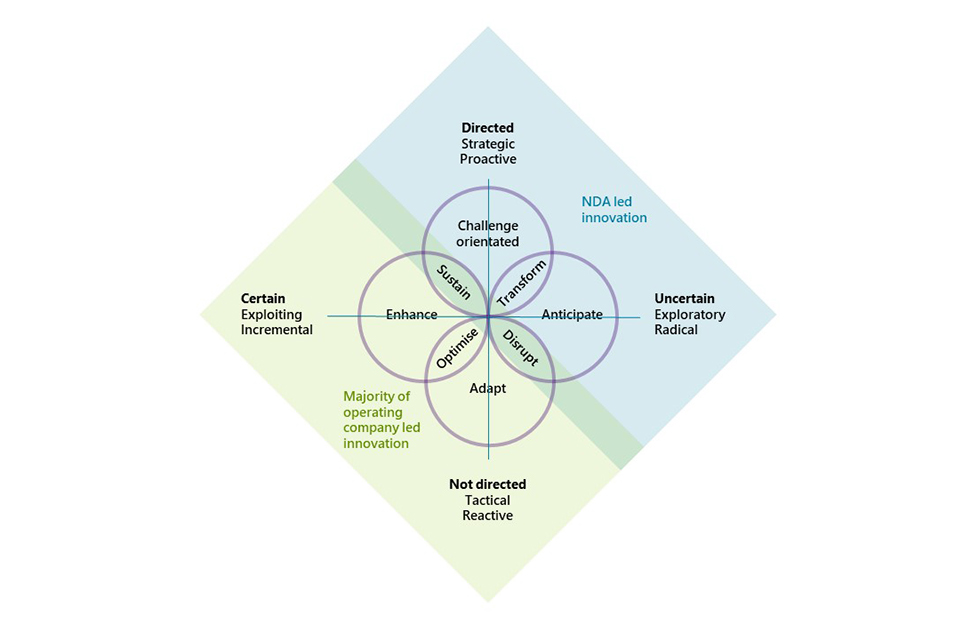
It is now clear we need to change our approach and set out our intentions to shift the balance; to reduce the barriers to innovation and to pursue additional opportunities to drive wider system and cultural change. This requires us to consider how we can better enable innovation across the group as well as how we align our efforts, and then enhance them to deliver maximum impact.
What are we aiming for?
Our aim is to transform delivery of our mission to improve safety, deliver quicker and to obtain better value for money for the UK taxpayer.
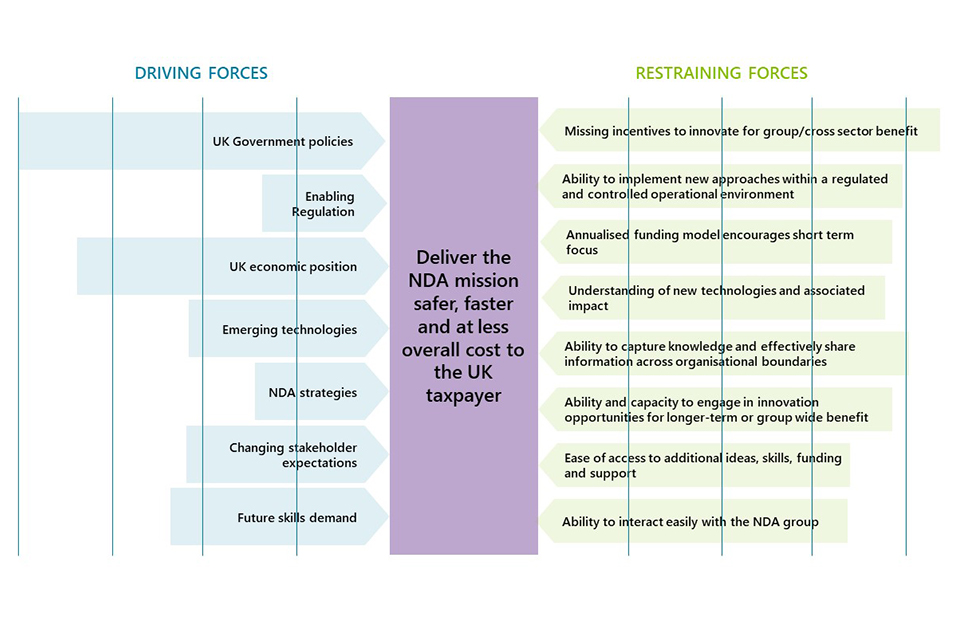
Evolving our current approach will deliver wider benefit, but it will not transform mission delivery or lead to a step change in safety or performance. To transform will require fundamental changes in our approach and culture; in what we do to deliver the mission as well as in how we choose to do business.
We need to put in place the right foundations on which we can build. In order to enable this change, we aim to:
- Grow our group wide in-house innovation management capability.
- Develop the skills of our leaders to drive this wider change across the group.
- Equip our people with the skills, support and tools required to innovate.
- Reward and recognise those who try to innovate.
- Enable innovation within wider business processes.
- Realise the benefits from ideas and investment elsewhere.
Changing our own approach to innovation will start to change the culture, but this cannot be done in isolation from the wider eco-system in which we operate. So our approach will need to consider our wider relationships with academia, the supply chain and regulators too.
What are we aiming for?
Initially, we will need to find ways to achieve additional mission impact and grow our innovation capability within existing resource constraints. This will require our leaders to actively reprioritise innovation and create the capacity needed in order to optimise our current approach. This will reinforce that innovation is important to us and deemed to add value.
Group operating companies will retain the flexibility to innovate locally but, as part of our One NDA approach, will also now have the shared responsibility, and be incentivised to collaborate and better align, communicate and co-ordinate these activities for wider group benefit too. This approach aims to raise collective awareness of innovation activities around the group, increase technology transfer, increase the level of standardisation for emerging approaches and shorten the time required to implement and release additional value from investment elsewhere.
The NDA will also encourage operating companies to increase their level of involvement in more transformative innovation activities, and increasingly take the lead on challenge-led projects or initiatives on behalf of the group; adopting shared open innovation mechanisms which encourage diversity in thinking and engagement with a wider supply chain.
Operating companies will need to provide opportunities to trial promising solutions emerging from such innovation projects, in order to increase end user exposure to new solutions, improve engagement and to de-risk further implementation in a representative operational environment. This will help to build wider stakeholder confidence and reinforce that outcomes can be achieved in many different ways. This re-focusing of existing resources will also enable the NDA to seek out future and more radical innovation approaches, to see what additional value those may bring, and focus effort on gathering the evidence needed to better understand and address the wider systemic barriers to innovation.
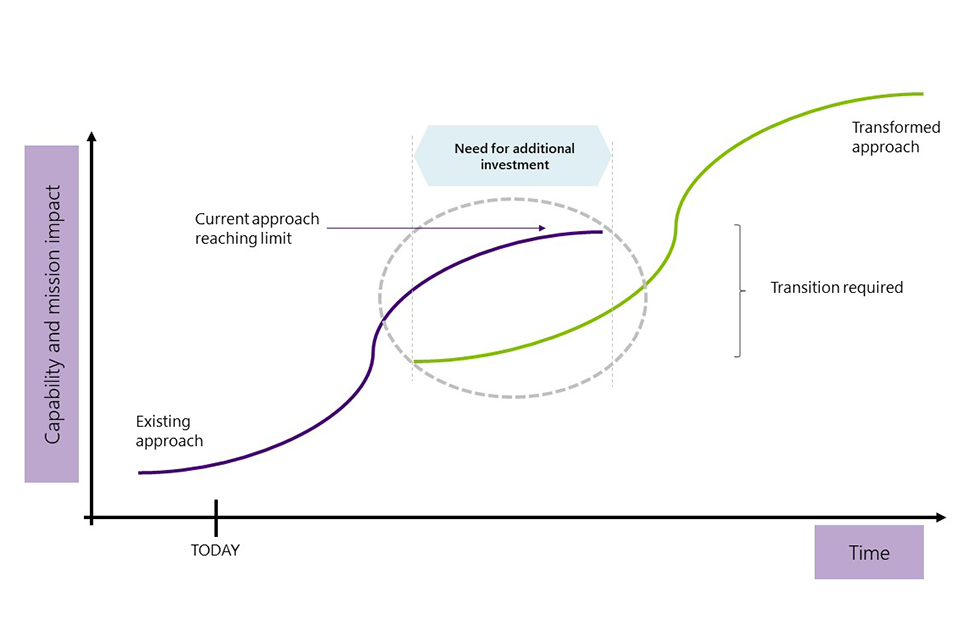
How will we get there?
As our collective innovation management capability is currently highly variable across the NDA group and requires the application of dedicated resources to develop it, we will need to adopt a phased approach to delivery, to evolve and then enhance our approach.
Individual capability improvement plans to improve technology related innovation for each operating company are already under development, and these will form the basis of short-term planned business improvement activities, with associated targets to improve the baseline capability in line with comparable sectors by March 2023.
In parallel, we will agree the common requirements and the overarching principles for managing our wider innovation activities across the group and develop a co-ordinated delivery plan for those shared group capabilities and for future business case development, to avoid duplicating effort.
This delivery plan will call upon other critical enabling functions, particularly those within HR, procurement, information and knowledge management. The NDA will take the lead on developing this overarching strategic plan, but it is expected representatives from all operating companies will work together to produce it.
How will we monitor progress?
Delivery progress of this strategy and associate plans will be monitored:
- Through the NDA group Technology and Innovation Steering Committee.
- By inviting external challenge through our Future Challenge Board.
- By benchmarking our capability against other sectors and internationally.
- Through regular updates to the NDA Group Leadership Team and respective operating company boards
Cultural aspects of the change will be assessed through:
- Annual staff surveys.
- Targeted innovation assessments.
- Regular contracted project monitoring activities/ feedback mechanisms.
Our short-term delivery priorities are to:
- Understand our collective group innovation management capability and the priority gaps to be filled, implementing the improvement action plans across the group.
- Establish a new horizon scanning approach by 2023 to gather additional technology intelligence, open to those across the group.
- Increase the level of active participation in existing shared innovation acceleration mechanisms, which have been established for wider NDA group use.
- Creating new mechanisms to undertake more agile innovation across the group, to be available when current arrangements expire.
- Understand where strategic interventions can be made to improve the wider culture, such as how we approach innovation in our risk management and sanction approaches.
- Communicate the results of projects within the innovation pipeline and share lessons learnt internally within the NDA group and externally.
- Improve our collective approach to innovation benefits management and evaluation to increase visibility of impact and to aid demonstration of value add.
- Deliver and build upon our radical innovation delivery programme, initially aligned to our published Grand Challenges for Technical Innovation.
- Identify and recognise areas of excellence, showcasing the innovation behaviours we wish to encourage within the group and wider supply chain.
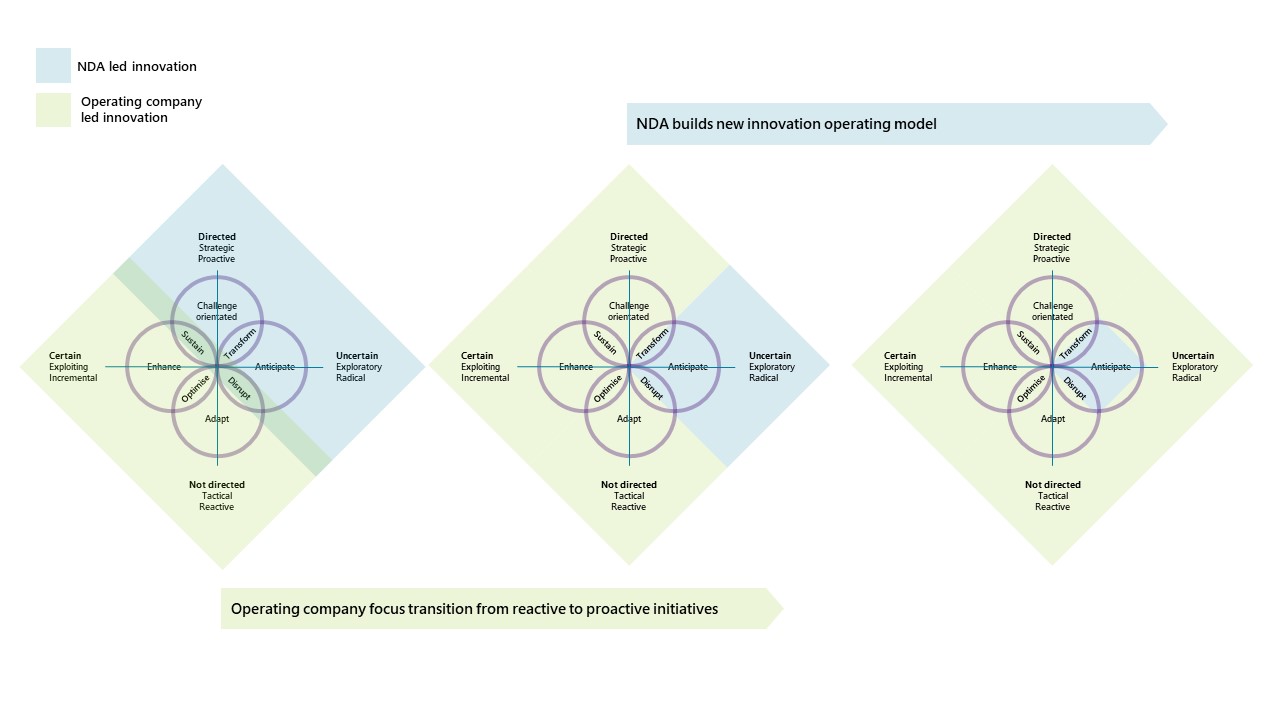
What will success look like?
Deliver the mission:
- We have built the foundations required to support an evolving innovation capability and extend it beyond its existing technology focus.
- We can search out NDA group challenges and identify possible approaches and technologies that will help solve them.
- We can select the best technologies/ wider innovative approaches to deliver our mission, considering the full range of factors that NDA group has identified as important.
- We implement our portfolio in an efficient and effective manner, trialling new approaches, sharing our findings and lessons we learn as we go.
- We can better capture the value of our portfolio and its impact on the NDA mission and wider UK prosperity, in order to demonstrate value and inform future decisions around additional investment needs.
- We benchmark against appropriate international comparators and are guided by principles set out in recognised standards, such as ISO:56002.
Trusted to do more
- We create additional benefits for the wider UK economy, supporting export campaigns and job creation by investing in a wide portfolio of challenge-orientated projects.
- We are a valued partner with our supply chain, international partners, government entities and other industrial sector bodies on innovation collaboration to share lessons and leverage wider funding.
Great place to work
- We increase opportunities to engage in self-led development and structured innovation activities which encourage cross group and cross sector networking, broaden experience and diversify our thinking
- We make it easier to find information and access the tools, training and techniques so our teams can effectively engage in innovation activities.
- We recognise, support and reward those who try to innovate, celebrating successes and setbacks, recognising they both give us an opportunity to learn and improve.
What do we expect of our people?
What do we expect of our leaders?
If we are to build and sustain our innovation capability across the group - we need our existing and future leaders to become advocates for change. The NDA Group Leadership Standard sets out that we all have a role to play to “create the future” and creativity is also one of our core values.
Line managers are encouraged to:
- incorporate innovation opportunities into business planning targets and activities.
- include innovation objectives as part of the Performance Development Review process.
- encourage and enable their teams to explore new ways of working, to help improve their own working environment or help create wider value for the business.
To be successful, we need all leaders and managers to empower their teams to innovate and create the capacity to engage in evolving our innovation approach. We recognise that leaders may not currently universally understand what innovation is, what good practice looks like or how best to engage. As we expect our leaders and managers to look beyond the immediate challenges and create space to explore alternate innovative approaches, we recognise we need to upskill and also incentivise and reward the behaviours we wish to see. As we build our capability, we will provide access to innovation tools and techniques, targeted training and support measures in order to enable this transition.
What can we all do?
If we wish to be innovative and transform our mission – we all have a role to play.
All of us can:
- Make it safe to contribute ideas - actively listen, seek to understand and explore - without criticising. Ideas can always be developed but they need to surface first.
- Share innovation attempts – there is value in understanding what was tried and why, irrespective of the final outcome – the knowledge gained may benefit others.
- Support colleagues who try – changing the status quo can take energy and personal courage, those who can see a different path care deeply about making things better.
- Help create the environment you want to be part of – don’t expect others to do it for you – innovation requires you to actively engage in the process.
